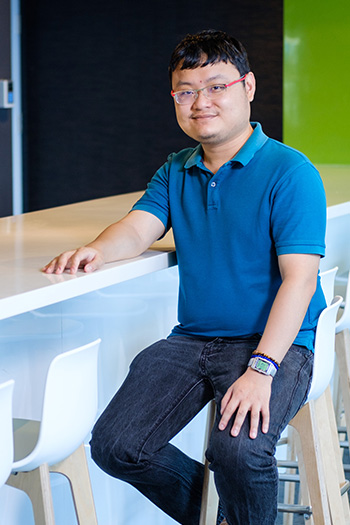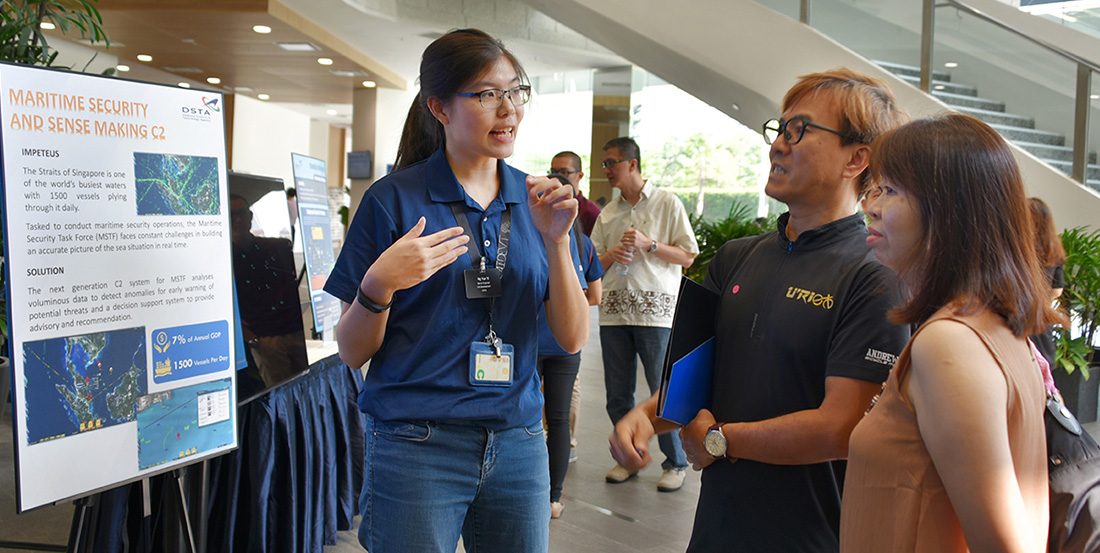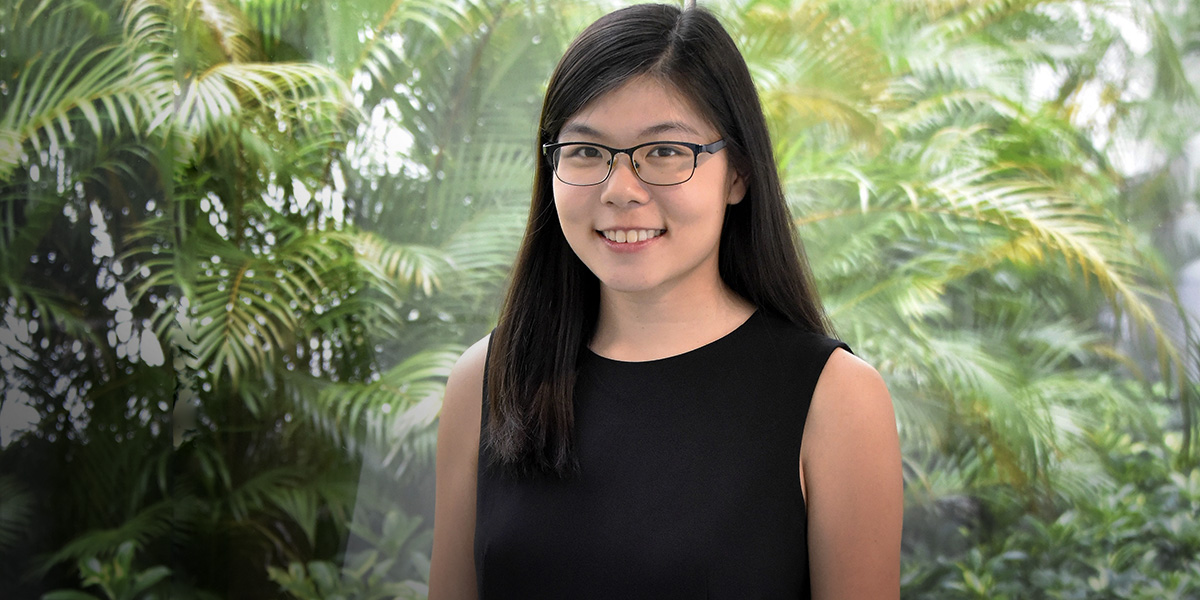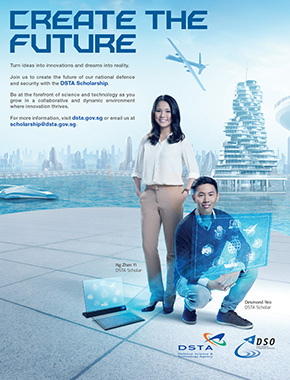As Singapore moves forward into the digital age, she faces new threats and challenges on the technological front. DSTA scholars Ng Yun Yi and Tay Hui Jun share why they are passionate about leveraging technology and engineering expertise for Singapore’s defence and security.
What sparked your interest in applying for a DSTA Scholarship?
Yun Yi: Math and science have always been my stronger subjects in school. I gravitated towards pursuing a career in engineering when it came to application for universities. The DSTA Scholarship offers opportunities to apply engineering knowledge and emerging technologies for developing realworld large-scale solutions. It also offers a wider range of engineering disciplines compared to other scholarships and it matches the qualities that I was looking for in a career: interesting, diverse and hands-on work, and the opportunities to grow and develop my skills.
Hui Jun: I wanted to work in R&D and felt that DSTA and DSO offered a more focused research environment as compared to other alternatives in the private sector. The flexibility in choosing what to focus on, given the broad spectrum of technologies we work with was something I valued. The opportunity to study overseas for greater exposure and with financial support was appreciated too.

Tay Hui Jun
DSTA Scholar
Cybersecurity Researcher
DSO National Laboratories
Master of Science (Electrical &
Computer Engineering)
Carnegie Mellon University
How has the scholarship adequately equipped you with the necessary qualities and skillsets to succeed in your field today?
Yun Yi: The DSTA Scholarship broadened my horizons with the opportunity to study overseas. Through the interactions with teaching staff who are leaders in their fields and classmates from around the world, I gained insightful perspectives on how collaboration is key to co-creating engineering solutions for the future. The scholarship also provided opportunities to undertake internships in DSTA. My stint at the C3 Development Programme Centre involved working on a proof of concept for the use of virtualisation in command and control systems. The internship gave me exposure to the innovative work done at DSTA and inspired me to learn more about programming and coding.
Hui Jun: The biggest contributor to my preparedness was the multiple internships I did as part of my scholarship. The work environment I experienced during my internships taught me the value of planning and independent learning, while exposing me to some of the common industrial practices in computer engineering. I was given autonomy to direct the scope and approach in my projects - this greatly helped both my university projects and current work in cybersecurity. I cannot emphasise enough the importance of continuous learning - never assume that you are ‘done’ with a subject.
How is your organisation constantly reinventing itself to align with the evolving trends and forces in the industry?
Yun Yi: It is important for DSTA engineers to keep abreast of advancements and breakthroughs in emerging fields such as artificial intelligence and robotics. This is so that we can adopt these technologies quickly to deliver value-added solutions that enhance the defence and security of our nation, as well as the lives of fellow Singaporeans. With DSTA’s focus on helping staff build deep engineering competencies, I have learned new skills in data analytics and design innovation through courses conducted by in-house subject matter experts and industry leaders worldwide. I even had the opportunity to organise an in-house hackathon that encourages ideation and application of new technologies!
Hui Jun: One of the main trends today is the increasing use of computing and automation in each industry. DSO addresses this trend in two ways that I find particularly meaningful. Firstly, the establishment of an Artificial Intelligence (AI) Hub is in a dedicated space - The Playground - to share and discuss the applications of AI with researchers from any discipline or division. Next, our efforts at nurturing future talents through programmes like the Young Defence Scientists Programme (YDSP) workshops and our various internship opportunities. As time changes, DSO looks to embrace and spread awareness of these new technologies.

Ng Yun Yi
DSTA Scholar
Development Programme Manager (C3 Development)
Defence Science and Technology Agency (DSTA)
Master of Engineering (Electrical and Electronic Engineering)
Imperial College London
How does your role today contribute meaningfully to the above objectives?
Yun Yi: My current work in the maritime security sense-making team involves the application of data analytics to a command and control system. The system fuses together shipping data from multiple sources and applies analytical algorithms to help operators sieve out potential maritime threats quickly. This project has given me opportunities to collaborate with the SAF and industry partners to strengthen Singapore’s defence.
Hui Jun: With increasing automation, use of computers and systems for control increases too. In this regard, cybersecurity becomes more important than ever to ensure safe and secure systems. As a Cybersecurity Researcher, my work involves looking at various measures to achieve assurance so that the systems will behave as expected even in the face of malicious tampering. I am also involved with the YDSP Cybersecurity workshops, Open Houses, and I give technical talks at sponsored events such as the NUS Hack & Roll this year.
What would you advise those who are exploring their scholarship options?
Yun Yi: Internships are a great way to learn more about the types of work, culture and learning opportunities that the organisation can offer. If your interests lie in science and engineering, DSTA would make a good choice for you to work with state-of-theart technologies and apply engineering knowledge to deliver smart systems.
Hui Jun: Many see scholarships and the corresponding bond as some sort of shackle to lock you down. Inherently, this mindset could set you up against the company offering you a scholarship. I would advise thinking about how well I can use the bond period when evaluating a scholarship, than ‘how fast I can get out of this bond’. Spending six years developing strong skillsets and experiences at a good company is far better than spending two years doing meaningless work. Six years might seem like a long time when you are 18 but think about it again when you are 28 or 50. Life’s a marathon after all.

